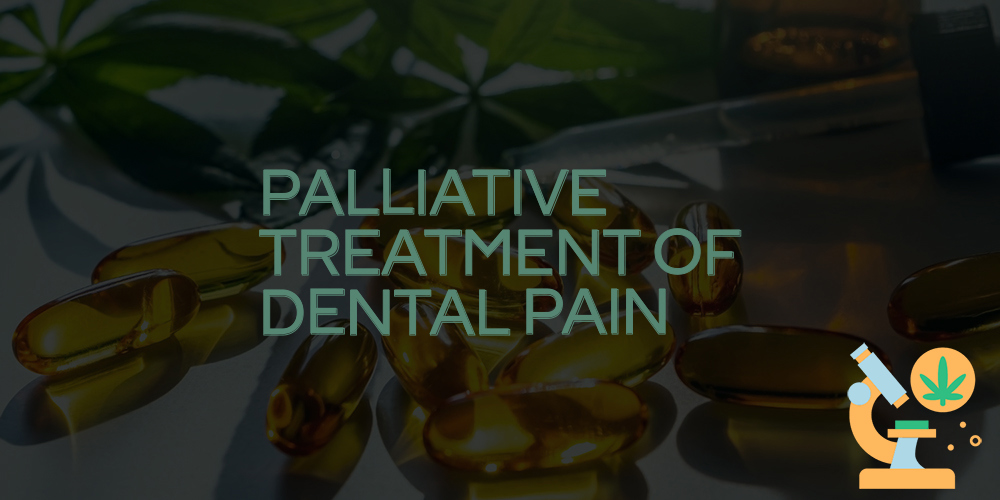Toothache can be severe, interfering with our daily lives and making even the simplest chores seem impossible. Finding an appropriate therapy for dental pain becomes a top priority when suffering from it. This is where palliative dental pain relief can help. This novel approach provides a solution for people seeking toothache treatment without the use of invasive surgeries or powerful drugs. In this post, we will look at the benefits of palliative dental pain relief and how it can bring much-needed relief from toothache suffering. So, if you’re seeking for a strategy to relieve your tooth pain, keep reading to find a solution that’s both effective and mild.

Understanding Palliative Dental Pain Relief: A Gentle Approach to Toothache Relief
When it comes to toothache, finding relief is critical. However, many people are hesitant to seek dental care because they are afraid of pain or discomfort. Palliative dentistry care, fortunately, takes a mild approach to toothache alleviation, trying to provide immediate comfort while addressing the underlying source of the pain. Individuals can make informed judgments about their oral health and seek prompt treatment if they grasp the notion of palliative dental pain alleviation.
Palliative dentistry care is concerned with the relief of pain and discomfort caused by various dental disorders such as tooth decay, gum disease, or dental trauma. The idea is to provide relief temporarily until a more complete treatment plan can be developed. This method entails using procedures and drugs to relieve toothache sensations, reduce inflammation, and soothe nerve endings. Palliative dentistry care seeks to provide immediate relief and enhance the patient’s overall comfort by addressing the root of the pain.
The gentle nature of palliative dental pain management is one of its key advantages. This approach places a premium on patient comfort and seeks to reduce pain and discomfort throughout therapy. Dentists that specialize in palliative care are skilled at using minimally invasive treatments such as topical numbing agents or local anesthetic for targeted pain reduction. Patients can undergo treatment with less worry or dread if these mild procedures are used, opening the door for a more positive dental experience.
Investigating Effective Toothache Treatments: Palliative Dental Pain Relief Methods
Finding effective and rapid relief from toothaches is critical. Palliative dental pain management procedures provide a viable solution for those suffering from dental discomfort. These treatments aim to alleviate toothache symptoms while addressing the underlying reasons. Patients can find great alleviation before seeking additional dental treatment by immediately treating the problem.
The use of topical analgesics is one of the most used palliative techniques for toothache alleviation. These over-the-counter numbing gels or liquids contain chemicals like benzocaine or lidocaine, which numb the affected area momentarily. Direct application of these analgesics to the tooth or gums can provide immediate comfort by numbing the nerve endings and decreasing pain signals to the brain.
In addition to topical analgesics, patients might seek palliative dental pain alleviation through home remedies. Among these natural therapies is rinsing the mouth with warm saltwater, which reduces inflammation and kills the bacteria that is causing the toothache. A cold compress applied to the affected area might also help relieve pain by numbing the nerves and lowering swelling. It is crucial to remember, however, that these home remedies should only be used as a temporary relief solution and not as a replacement for professional dental care.
Understanding the Treatment Options for Toothache Relief with Palliative Dental Care
A toothache can be severe, causing significant suffering and interfering with regular tasks. When suffering from a toothache, it is critical to seek palliative dental care to relieve the pain and address the underlying problem. The goal of palliative dentistry care is to provide instant relief while also increasing the patient’s overall comfort. Understanding the many treatment options available might assist people in making informed decisions and finding effective relief for their toothache.
Pain medication is a popular palliative dental care treatment. To relieve toothache discomfort, dentists may prescribe over-the-counter pain medications such as ibuprofen or acetaminophen. These drugs serve to reduce inflammation and provide temporary comfort until the underlying problem is addressed. To avoid any adverse effects, it is critical to follow the dentist’s recommendations and not exceed the appropriate dosage.
Dentists may offer cold or hot compresses to the affected area in addition to pain medication. Cold compresses can help reduce swelling and numb the region temporarily. Hot compresses, on the other hand, can enhance blood circulation and relieve pain. To ensure optimal effectiveness, dentists will instruct patients on the proper usage of compresses and the duration of each application.
Immediate Toothache Relief Through Palliative Dental Pain Relief
When it comes to dental discomfort, consumers frequently prioritize fast treatment. Toothaches can be excruciatingly painful, creating throbbing discomfort and making it impossible to eat, sleep, or focus. Palliative dental pain management procedures, fortunately, can provide immediate and effective relief, helping people to manage their toothache symptoms until they can receive correct dental care.
Palliative dental pain therapy focuses on relieving toothache discomfort rather than curing the underlying cause. While it is critical to see a dentist to address the underlying cause of tooth pain, palliative remedies can provide temporary comfort in the meanwhile. Over-the-counter pain medications, such as ibuprofen or acetaminophen, are commonly used in these approaches to help minimize inflammation and discomfort. To provide rapid comfort, numbing gels or ointments containing benzocaine can be administered directly to the affected tooth or gums.
Rinsing the mouth with warm saltwater is another popular approach for providing quick toothache relief. This simple yet powerful strategy aids in the reduction of inflammation, the killing of bacteria, and the relief of pain. Individuals can temporarily relieve toothache symptoms by mixing half a teaspoon of salt in a cup of warm water and swishing it around the mouth for 30 seconds before spitting it out. It is crucial to note, however, that these palliative measures should not be used in place of a visit to the dentist because they only provide temporary relief and do not address the underlying tooth disease.
Palliative dental pain alleviation has proven to be an excellent toothache treatment alternative. This method offers much-needed comfort to people suffering from dental pain, helping them to manage their symptoms and enhance their quality of life. Dental practitioners can successfully relieve toothache agony by using numerous procedures such as local anesthetics, over-the-counter pain medicines, and natural therapies. It is critical to understand the importance of palliative care in dentistry since it serves patients’ acute pain management needs while they await final treatment. Dentists and other oral health experts are critical in ensuring that patients receive proper pain management, as well as increasing patient comfort and satisfaction. Overall, the introduction of palliative dental pain reduction strategies demonstrates dental professionals’ dedication to prioritizing patient well-being and providing effective pain relief solutions.
